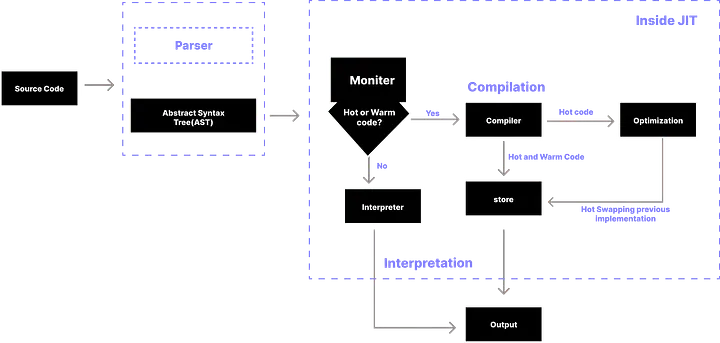
How JIT Compilation Supercharges Your JavaScript
September 1, 2025
How JIT Compilation Supercharges Your JavaScript
JavaScript engines use the JIT(just in time) compiler to execute the code.
I know you must be wondering what the hell is JIT and how it works?

Suppose: you're building a new web app with all the latest JavaScript features. Everything looks great, but then you notice it's... kind of slow. Back in the day, this was a massive problem for JavaScript developers. The language was literally too slow for complex applications.
What happened? The secret is called JIT compilation.
let’s understand JIT
1. Interpreted Languages
-
Code is executed line by line by an interpreter
-
No machine code is generated in advance
-
Pros: Very fast (runs immediately)
-
Cons: Slower execution. Code is re-parsed every time.

// Example: interpreted execution
let x = 5;
let y = 10;
console.log(x + y); // Interpreter reads & runs line by line
2. Compiled Languages
-
Source code is fully compiled into machine code before execution.
-
Pros: Extremely fast runtime execution
-
Cons: Slow startup, less flexible
 Example: C, C++ are compiled before running.
Example: C, C++ are compiled before running.
Why JIT Was Introduced
-
Slow performance of interpreted code: Interpreters reprocess the same code repeatedly. JIT caches machine code for faster execution.
-
Balance between speed & execution speed: Interpreters start instantly; compilers run fast after compiling. JIT gives us both.
How JIT Actually Works
1. Parsing → AST
JavaScript code is parsed into an Abstract Syntax Tree (AST) - a structured representation of your code.
2. Bytecode Generation
The AST is converted to bytecode, which can already run.
3. Hot Code Detection (Profiling)
It's basically profiling your code to see which parts get used the most. We call these "hot code". The engine monitors which functions/loops run most often.
function add(a, b) { return a + b; }
// This loop gets flagged as "hot code"
for (let i = 0; i < 1_000_000; i++) {
add(2, 3);
}4. JIT Compilation
Hot code is compiled into optimized machine code that runs directly on the CPU → much faster.
5. Optimization & De-optimization
If something changes (like a variable type), the engine can backtrack and re-optimize as needed.

Final Note: Just-In-Time (JIT) compilation combines the features of both an interpreter and a compiler.